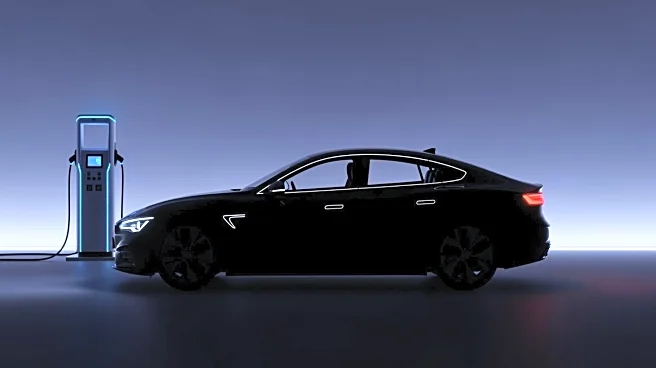What's Happening?
General Motors (GM) is planning to introduce a family of affordable electric vehicles following the revival of the Bolt, which is priced under $30,000. This initiative is driven by internal research and
development aimed at competing with China's low-cost electric vehicles. GM President Mark Reuss emphasized the need for innovation rather than imitation, stating, 'We have to be better.' GM is focusing on enhancing its Ultium platform and is betting on lithium manganese-rich (LMR) batteries, with plans to release its first LMR-based EV model in 2028 in collaboration with LG. Meanwhile, Tesla is taking a different approach by releasing trimmed-down versions of its Model 3 and Model Y to reduce prices. Tesla's next major release is the Cybercab, a vehicle optimized for full autonomy without a steering wheel, expected to start production in Q2 next year.
Why It's Important?
The competition between GM and Tesla highlights the evolving landscape of the electric vehicle market in the U.S. GM's strategy to offer affordable electric cars could significantly impact the market by making EVs accessible to a broader audience, potentially increasing adoption rates. This move could challenge Tesla's dominance, especially as Tesla focuses on autonomous vehicles with the Cybercab. The success of GM's affordable EVs could influence other automakers to prioritize cost-effective electric solutions, thereby accelerating the transition to sustainable transportation. Conversely, Tesla's focus on autonomy could redefine vehicle ownership and usage, impacting industries related to transportation and mobility.
What's Next?
GM's plans to develop a family of affordable electric cars are set to unfold over the coming years, with the first LMR-based model expected in 2028. This development could prompt other automakers to explore similar strategies to compete in the low-cost EV market. Tesla's Cybercab, slated for production next year, will test the market's readiness for fully autonomous vehicles. The success or failure of these initiatives will likely influence future investments and innovations in the automotive industry, shaping the direction of electric and autonomous vehicle development.
Beyond the Headlines
The shift towards affordable electric vehicles and autonomous driving raises ethical and regulatory questions. The introduction of fully autonomous vehicles like Tesla's Cybercab may require new safety standards and regulations to ensure public safety. Additionally, the affordability of electric vehicles could democratize access to sustainable transportation, potentially reducing carbon emissions and contributing to environmental goals. However, the focus on autonomy might lead to job displacement in driving-related professions, necessitating discussions on workforce adaptation and retraining.









